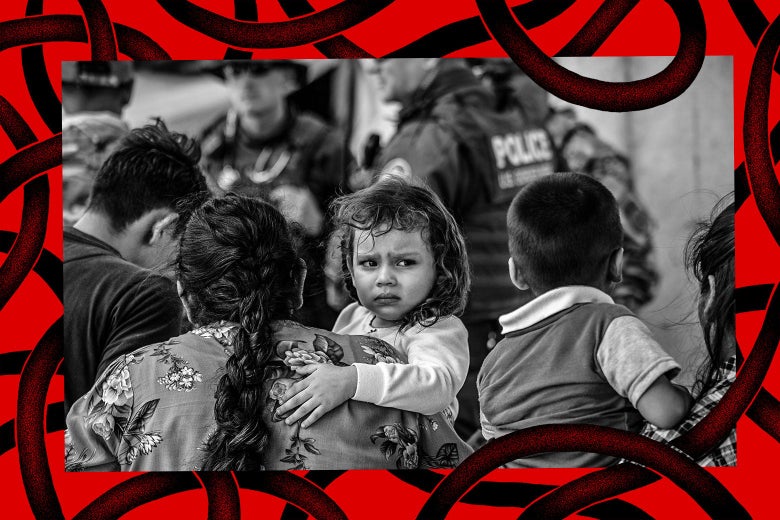
This is part of What We Learned, a series of reflections on the meaning and legacy of the Trump years.
One of the last things the Trump administration did, while it still had the power to do it, was reportedly kidnap a 9-year-old boy from his family. Customs and Border Protection officials at San Francisco International Airport denied entry to 19-year-old Christian Laporte and his younger brother, Vladimir Fardin, traveling from Haiti on U.S.-issued student and tourist visas respectively last Sunday—and then separated them from each other, declared Vladimir to therefore be an unaccompanied minor, and shipped him off to a detention center.
This was, by this point in Donald Trump’s term, not particularly surprising. Child abuse was at the center of the country’s immigration policy for these past four years, part of an intentional effort to scare people away from trying to come here. Hundreds of children disappeared into custody with no effort to keep track of them or reunite them with their families. A regime that had already been inhumane under President Obama, pushing migrants toward deadly desert crossings, turned fully malignant, with federal agents destroying water supplies and prosecutors targeting humanitarian workers. Asylum laws were cast aside.
On one level, this was straightforwardly racist, joining the goals of white nationalist policymakers like Stephen Miller to the daily bigotry of many border patrol officers. Rhetorically and conceptually, though, it was an effort to roll back the consensus that the United States is a nation of immigrants. The attack extended to legally documented immigration and residency, and on to citizenship itself, breaking precedent to strip people of what had seemed like a secure membership in the nation.
As Adam Serwer indelibly wrote, the cruelty of this was the point. The politics of Trumpism were built around white people sharing in rituals of viciousness and exclusion, coming together to follow their leader’s rejection of their designated enemies and to revel in how far things would go.
But the longer the administration wore on, the more the cruelty seemed to have another, horrifyingly practical point behind it. Trumpism was not just testing how hateful the country could be. It was exploring the limits of America’s capacity for indifference.
By the end, there were no limits to be found. The people thrown into detention at the border or deported at random may have been the first to be treated as nonpersons, but they soon had more company than anyone could count. Hurricane Maria hit U.S. territory in Puerto Rico, and the administration simply failed to respond, leaving hundreds and then thousands of people to die. It was Katrina all over again, except it wasn’t: No real lasting blame attached itself to the government’s deadly failure. The death toll rarely made it to the top of any lists of the president’s wrongdoing.
Again and again, Trump chose to ignore suffering, reacting grudgingly or not at all to disasters that happened on his watch. As one lethal California fire season led to another, Trump focused on blaming imaginary forest-management policies. When Iowa was flattened by windstorms, federal authorities and the Trump-loyal state government wasted a week before declaring a disaster.
And rising up to subsume it all was the coronavirus pandemic. The federal response to COVID-19 was incompetent, and it was unprepared, and it was dishonest, but the true horror was that it was blasé. The bodies piled up in nursing homes, and then in refrigerated trucks on the streets of New York City, and all the while it was someone else’s problem. There was no protective equipment and no working plan to get it; there was no testing, and once there was, the president wanted to slow it down for his own self-interest. There were sirens in the streets round the clock, and there was not even any hand sanitizer on store shelves.
Instead of fighting the pandemic, Trump chose to fight against the fight. And his supporters rallied to him. Better that people should go back to work and get sick and die than that the government should restrict commerce or even require masks. The disease was something that was happening to other people, even when it happened to Trump himself.
Now it is happening everywhere at once, with the country on its way to half a million dead, and somehow it is still someone else’s problem. People are staging anti-mask protests in places where emergency rooms are over capacity. Mass suffering has been transformed into one more background fact to argue about politically, even for the millions of us who’ve considered ourselves horrified by it all along. The sense of moral crisis has subsided, though the actual human crisis is worse each day than it was the day before.
Life often seemed cheap to Americans when it was in other places, but now it’s cheap right outside our own windows, or inside them. Trump, in his constant flight from uncomfortable truths, pointed the country toward a real and brutal plausible future. Between crop failures and floods and lethal heatwaves, great expanses of the planet are on their way to becoming uninhabitable. The millions of people who currently live in those places cannot stay there. In the coming decades, disaster will be commonplace, and the world will need an answer for the people displaced by it. The Trump administration, in this light, was proposing what one answer could be: dead bodies, piled up until they’re out of view. The country, it seems, can live with that.
"much" - Google News
January 25, 2021 at 07:00AM
https://ift.tt/39e6ZAo
We Had No Idea How Much Suffering We Could Ignore - Slate Magazine
"much" - Google News
https://ift.tt/37eLLij
Shoes Man Tutorial
Pos News Update
Meme Update
Korean Entertainment News
Japan News Update
Bagikan Berita Ini














0 Response to "We Had No Idea How Much Suffering We Could Ignore - Slate Magazine"
Post a Comment